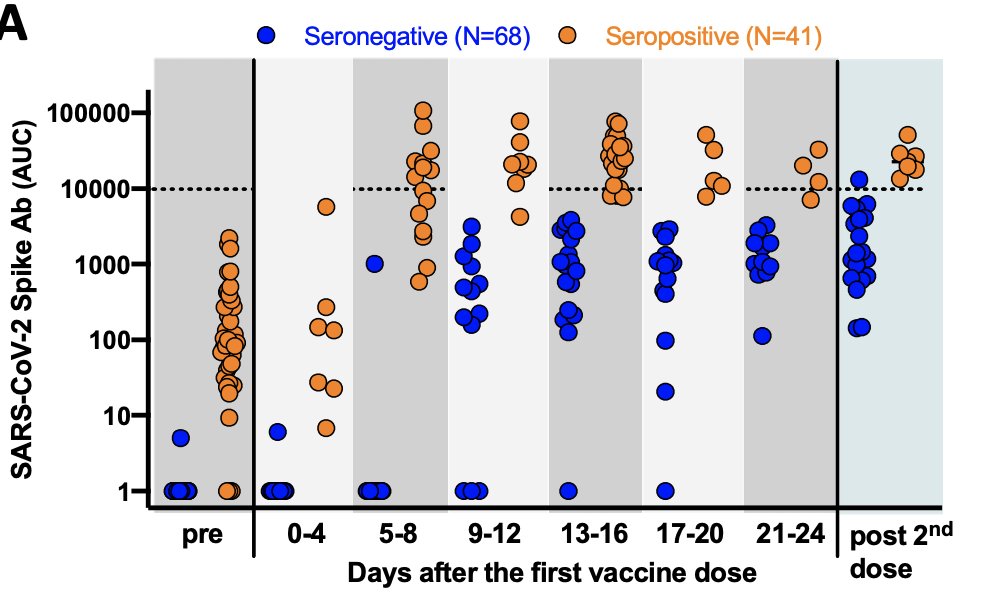What about vaccinating people who have already had COVID? I get this question a lot. New answers now!  https://www.nytimes.com/2021/02/01/health/have-you-had-covid-19-coronavirus.html
https://www.nytimes.com/2021/02/01/health/have-you-had-covid-19-coronavirus.html
 https://www.nytimes.com/2021/02/01/health/have-you-had-covid-19-coronavirus.html
https://www.nytimes.com/2021/02/01/health/have-you-had-covid-19-coronavirus.html
Excellent and rapid work to find that, for people who have previously had COVID, one COVID vaccine dose gives a bigger antibody response than seen in COVID-negative people receiving a normal two dose COVID vaccine regimen.
One study by Viviana Simon & @florian_krammer and colleagues. And an independent stduy by Sajadi and colleagues in Maryland.
One dose of vaccine gave high binding antibody titers
https://www.medrxiv.org/content/10.1101/2021.01.29.21250653v1
https://www.medrxiv.org/content/10.1101/2021.01.29.21250653v1
And in the Sajadi study found high neutralizing antibodies.
https://www.medrxiv.org/content/10.1101/2021.01.30.21250843v2
While they don't have the direct comparison group of COVID-negative people who received two vaccine doses, those neutralizing titers are convincingly high, and they track with the binding antibody
https://www.medrxiv.org/content/10.1101/2021.01.30.21250843v2
While they don't have the direct comparison group of COVID-negative people who received two vaccine doses, those neutralizing titers are convincingly high, and they track with the binding antibody
I have no problem with health officials who want to keep the vaccine schedule based on the Phase 3 trial data. But, to me, these data are convincing enough, in the context of current vaccines EUAs, that people with previously confirmed COVID-19, a single dose of vaccine is enough
, and with fewer side effects.
To be clear, in a non-pandemic situation, the data one would want to make such a recommendation would be quantitation of the following, in comparison to the regular COVID RNA vaccines schedule:
- side effects
- Neutralizing antibody titers
- T cell responses
- Durability of both antibodies and T cells
- Neutralizing antibody titers
- T cell responses
- Durability of both antibodies and T cells
But, for me, the combo of high neutralizing/binding antibodies and the side effect reports are enough, even if it is a temporary recommendation for current pandemic conditions.
The question of WHEN a person with previously confirmed COVID should be immunized is a different question.
As previously mentioned, waiting 90 days is reasonable. https://twitter.com/profshanecrotty/status/1350478079081123841?s=20
and the NEJM allows for a similar conclusion https://twitter.com/profshanecrotty/status/1350478079915769858?s=20
Additional data could support different schedules in the future. But, while there is certainly evidence of immune memory and protective immunity against COVID lasting 6+ months (see our other work and tweets),
as I said on the BBC show The Evidence this past week, nothing compares to a Phase 3 clinical trial for proof! That is to say, the vaccines definitely protect, so the wisest course of action is to get vaccinated when you can.

 Read on Twitter
Read on Twitter



